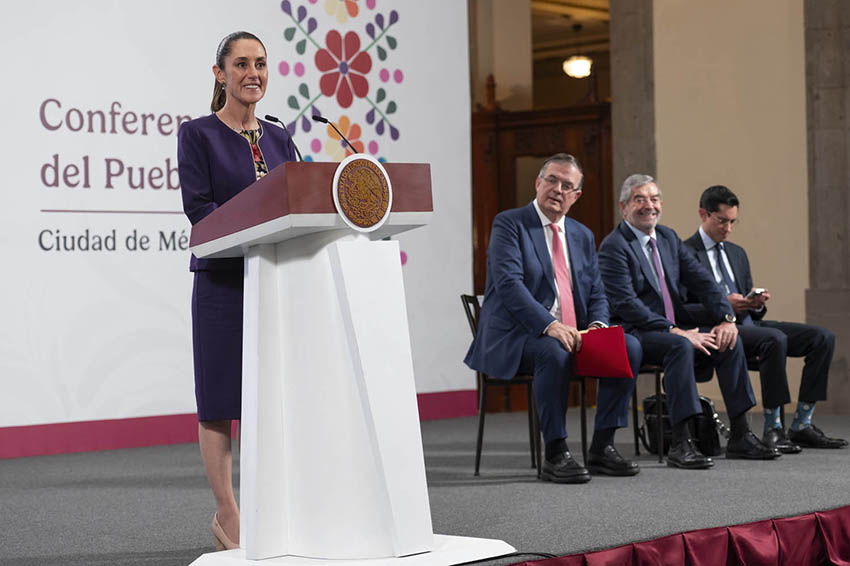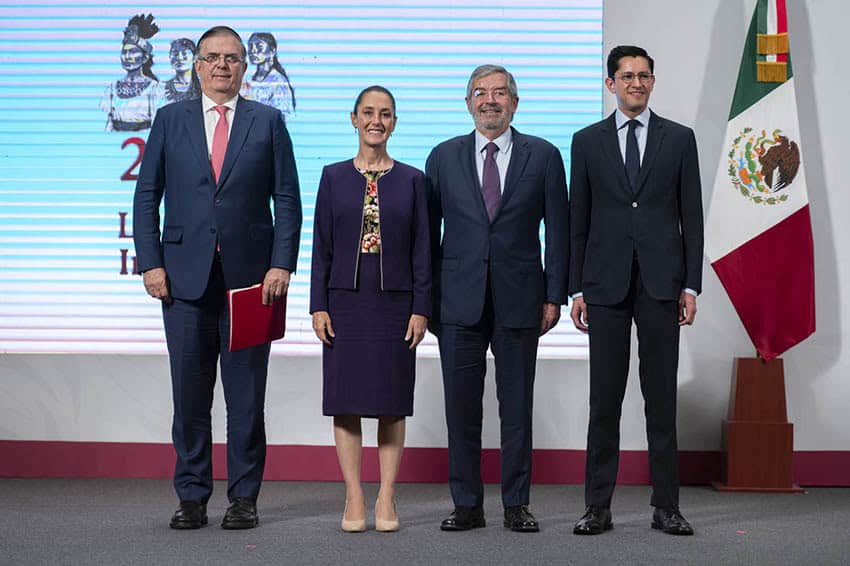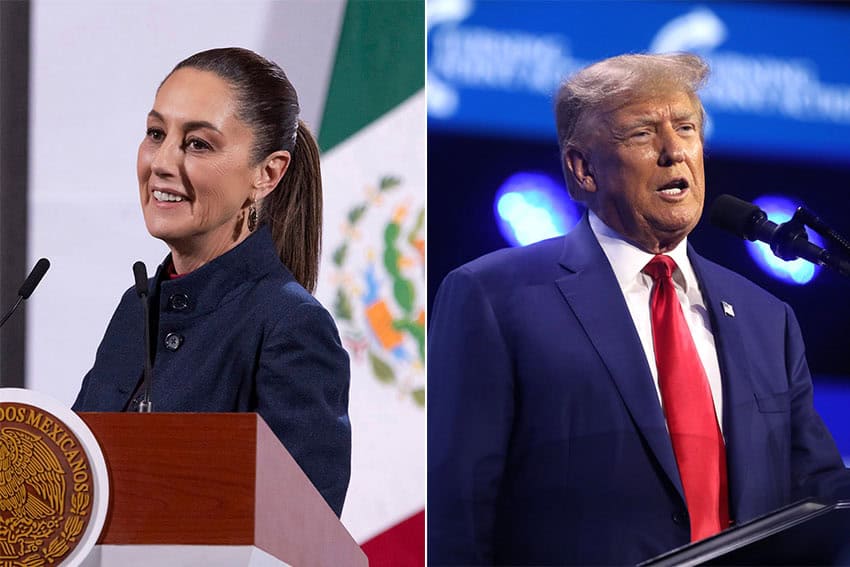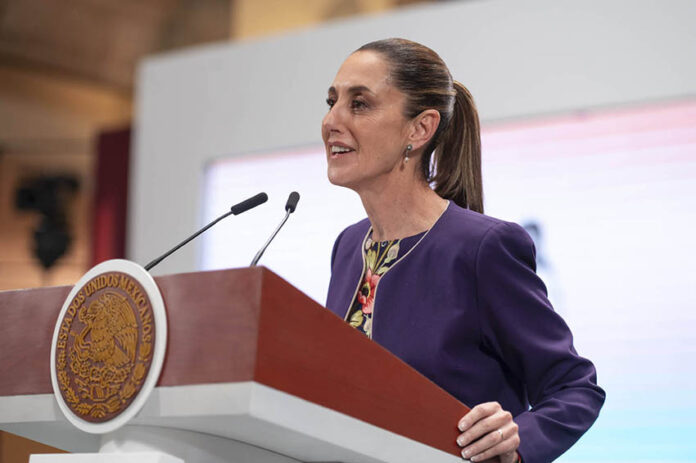President Claudia Sheinbaum started her Thursday morning press conference at the later time of 10 a.m. as she had a telephone call with U.S. President Donald Trump earlier in the day.
The outcome of the call? A 30% tariff Trump threatened to impose on imports from Mexico won’t take effect as scheduled this Friday.

At the beginning of her press conference, Sheinbaum said that Mexico “achieved a good agreement” that “protects the USMCA,” the North America free trade pact that is scheduled for review in 2026.
Most Mexican products that comply with the rules of the three-way trade pact currently enter the U.S. tariff-free, while non-USMCA compliant goods face a 25% duty. That situation won’t change as Mexico and the United States seek to come to a longer-term agreement on trade during the next 90 days.
Economy Minister Marcelo Ebrard said this week that 84% of Mexico’s trade with its northern neighbor complies with the USMCA and is therefore tariff-free.
Trump told Sheinbaum in a letter earlier this month that he intended to impose a 30% tariff on imports from Mexico because Mexico wasn’t doing enough to combat the trafficking of fentanyl to the United States.
It was unclear whether the 30% duty would have applied to all imports from Mexico or just those that don’t comply with the USMCA.
Mexico didn’t commit to any ‘additional action’ to win tariff reprieve, says Sheinbaum
A reporter asked the president whether Mexico offered anything specific to the United States that allowed it to win a reprieve from the tariff that was scheduled to take effect on Friday.
Sheinbaum said that Mexico “made various propositions” to the United States, including one on how to reduce the trade deficit the United States has with Mexico.
She said that Mexican officials also spoke to their U.S. counterparts about “significant investments” of United States companies in Mexico.
“But they remained on the table,” Sheinbaum said of Mexico’s proposals.
“The agreement we have didn’t involve any additional action on Mexico’s part,” she said.
On social media, Trump said on Thursday morning that “Mexico has agreed to immediately terminate its Non Tariff Trade Barriers, of which there were many.”
Asked about that statement, Sheinbaum responded:
“In the USMCA, there are a number of agreements — many of them — related to labor issues, investment issues, and many other issues. So, there are always complaints from Mexico or complaints from the United States toward Mexico.”
Asked which non-tariff trade barriers Mexico would terminate, Sheinbaum referred the question to Ebrard.
The economy minister said that Trump was referring to “trade regulation issues,” but didn’t cite specific barriers that Mexico would eliminate.
“There are a series of questions that aren’t just: ‘What tariff am I going to impose on you?’, but rather ‘How will our trade work in the years to come?’, and that is what we are working on,” Ebrard said.
What will Mexico seek to achieve in the next 90 days?
In a social media post on Thursday morning, Sheinbaum said that Mexico had secured “90 days to build a long-term [trade] agreement through dialogue” with the United States government.
That agreement will be separate from the USMCA.
Sheinbaum said that the “most important thing” for Mexico is to continue to have the best possible trading situation with the United States — one that places the country in an advantageous position compared to the rest of the world.
“That’s what we’re seeking,” she said.
‘Mutual respect’ key to reaching deal to avoid 30% tariff, says Sheinbaum
Asked what the key was to achieving Thursday’s agreement with Trump, Sheinbaum cited “mutual respect.”
“We have to say it, President Trump has treated us with respect in all the calls we’ve had,” she said, noting that she has spoken to the U.S. leader on various occasions.
She added that she and her government also treats Trump with respect.

Sheinbaum said that another factor that allowed Mexico to avoid the 30% tariff is the importance of the country to the United States.
“Mexico represents a lot for the United States. We are their main trade partner, and they’re aware of that,” she said.
In addition, Mexico has made progress in the fight against fentanyl, seizing large quantities of the synthetic opioid during the Sheinbaum administration and dismantling more than 1,000 clandestine lab where that drug and others were made.
No in-person meeting between Sheinbaum and Trump is planned
Sheinbaum said that no arrangements had been made for her to meet face-to-face with Trump.
“We simply said goodbye to each other very cordially and he said: ‘Well, I hope to speak to you in around 90 days,'” she said.
Mexico to continue negotiating on steel and auto tariffs
Sheinbaum noted that existing U.S. tariffs on steel, aluminum, vehicles and tomatoes will “remain as they are.”
“But that doesn’t mean that will be the case … [during the next] 90 days. We’re still working on that,” she said, referring to efforts to have the duties eliminated or reduced.
Sheinbaum stressed that Ebrard has “a lot of contact” with United States Commerce Secretary Howard Lutnick and U.S. Trade Representative Jamieson Greer.

She also said that Foreign Affairs Minister Juan Ramón de la Fuente has a “very good relationship” with U.S. Secretary of State Marco Rubio.
Mexican steel and aluminum currently face a 50% tariff when entering the United States, while vehicles are subject to a 25% duty, although U.S. content is exempt from the tax. A 50% U.S. tariff on copper products will take effect on Friday.
Fresh Mexican tomatoes face a 17% tariff, imposed by the United States earlier this month after it withdrew from a 2019 agreement with Mexico that suspended an antidumping duty investigation.
Ebrard: Sheinbaum’s capacity to persuade Trump is ‘remarkable’
Ebrard told Sheinbaum’s press conference that “as a witness of the call” the president had with Trump, he was able to say that her “handling” of the discussion with the U.S. president was “splendid.”
“This is a result that is due to that,” he said.
“… Without any intention of flattery, I can tell you that the management the president has of her conversations, her manner, the firmness with which she defends the interests of Mexico and her capacity to persuade President Trump, is remarkable,” Ebrard said.

Earlier this year, The Washington Post described Sheinbaum as “the world’s leading Trump whisperer.”
Ebrard said that Mexico remains in a “much better” position than “the rest of the countries of the world” in terms of trade with the United States.
He highlighted, once again, that 84.4% of Mexico’s trade with the United States is tariff free thanks to the USMCA.
“No other country has that, with the exception of Canada,” Ebrard said.
De la Fuente also lauds Sheinbaum
Foreign Minister de la Fuente, who was also present during Sheinbaum’s call with Trump, was also effusive in his praise for the president.
He lauded Sheinbaum’s “leadership and her extraordinary capacity for dialogue” with Trump, who he described as “a world leader who has been very explicit in his propositions and points of view.”
De la Fuente also praised Sheinbaum’s “firmness in the defense of the interests of our country and her intelligence in conducting a conversation that provides enormous advantages to Mexico.”
By Mexico News Daily chief staff writer Peter Davies (peter.davies@mexiconewsdaily.com)
